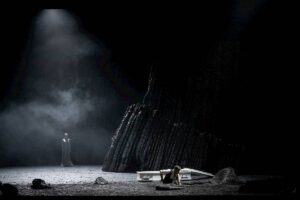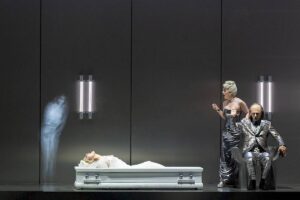The beginning of June marked precisely seventy years since the first attempt to perform L’Orfeo on period instruments: at the Wiener Festwochen, under the baton of Paul Hindemith, officially with the Wiener Symphoniker, in fact – with musicians recruited from that orchestra, who were part of the still “nameless” ensemble, Concentus Musicus Wien, founded a year earlier by the Harnoncourts. In the long journey of Monteverdi’s masterpiece to operatic stages, Swiss tropes were already present: the performers used material prepared by Hindemith, who took up a professorship at the University of Zürich after the war. The modest staging on the Konzerthaus stage was by Leopold Lindtberg, who had left Vienna in 1933, fleeing the brownshirt revolution, and reached Switzerland by a circuitous route through Paris, Warsaw and Tel Aviv.
The sound recording of the 1954 event was released just over a decade ago, too late for L’Orfeo aficionados – even the oldest ones, who grew up with the famous recordings featuring Layos Kozma or Nigel Rogers – to treat it as something else than a mere period curiosity. What did go down in history, however, was the Opernhaus Zürich’s venture, initiated shortly after the composer’s four-hundredth birthday and launched with a staging of La favola d’Orfeo that proved to be a real breakthrough in the history of the work. Firstly, because of Jean-Pierre Ponnelle’s theatrical concept, which defined the canon of staging Baroque operas for many years to come. Secondly, by commemorating this production in a television film, later released on DVD, thanks to which we gained access to the chronologically oldest video recording of L’Orfeo. Thirdly and most importantly, because of the musical direction of Nikolaus Harnoncourt, who decided to create a separate ensemble at the Zürich company for the Monteverdian cycle and to assemble the cast primarily from among local artists (the eponymous Thracian singer was portrayed by Philippe Huttenlocher, perhaps the first baritone performer of the role in the history of period instrument performance).
José Maria Lo Monaco (La Musica) and Krystian Adam (Orfeo). Photo: Monika Rittershaus
Thus it would not be an exaggeration to say that L’Orfeo began its modern stage life in Zürich. And however we judge Ponnelle’s stagings today – long outdated according to malcontents, still treated as an important point of reference by no less numerous enthusiasts – it is impossible to avoid comparisons between the memorable initiative of the 1970s and the new productions of Monteverdi operas, which have appeared regularly on the local stage since Andreas Homoki took over as director of Opernhaus Zürich. After Il ritorno d’Ulisse in patria directed by Willy Decker and L’incoronazione di Poppea by Calixto Bieito it was time for Orfeo. The latest premiere was prepared by Evgeny Titov, a relatively young graduate of the St. Petersburg Theatre Arts Academy, who, after a brief acting career in Russia, went on to study at the Reinhardt Seminar in Vienna and has since directed mostly drama. His experience in opera is limited to just a handful of productions, of which last year’s Poppea at the Opéra national du Rhin was unanimously criticised for being incompatible with Raphaël Pichon’s musical concept.
The Zürich Orfeo fared even worse in that it diverged from the concept of Monteverdi himself. Titov places the whole thing in a uniformly dark setting (set design by Chloe Lamford and Naomi Daboczi, costumes by Annemarie Woods), only occasionally illuminated by the cold flash of steel, the pallid light of fluorescent tubes and the bluish glow of slow-motion projections, bringing to mind irresistible associations with ectoplasm floating in the dark. Orpheus digs a grave already in the Prologue, Eurydice will rise from a coffin before the wedding, and will return to it often enough to make the spectators doubt whether they are really dealing with a flesh-and-blood being. The phrenetic energy of the first act and the beginning of the second act – until the words “dopo il mal vie più felice”, after which the Messenger arrives and Orpheus sees for himself in the cruelest possible manner that the sleeping dogs should be left lying – is not reflected at all on stage. The joyful dances of the shepherds take the form of grotesque pre-nuptial rituals – in the barren blackness of basalt rocks, with faded flowers in men’s boutonnieres and large artificial fruits in place of the lushness of Thracian meadows. It gets brighter – paradoxically – only after the descent into Tartarus. Death, however, lurks everywhere. Having lost Eurydice again – though she may have been dead from the very beginning – Orpheus finds himself back in the same setting with a white coffin and a dug up grave. Summoned by Apollo to heaven, he lingers a bit too long. A loud shot is heard in the darkness of the stage.
Krystian Adam. Photo: Monika Rittershaus
There was some discussion in the lobby about whether the director wanted to turn Monteverdi’s tale of Orpheus into a suicide’s nightmarish dream, an equally nightmarish journey into the depths of emotions that accompany loss, or a universal parable about the disastrous consequences of an excess of feelings. I dare to formulate yet another hypothesis: that Titov made an unsuccessful, though at times visually appealing, attempt to tell the story of Orpheus through Bulgakov’s The Master and Margarita. Hence the strange resemblance of scenes in the first act to the grand ball at Satan’s. Hence the ubiquitous darkness of the staging, for the Master does not deserve light, only peace and quiet. Hence the suspiciously Mephistophelean appearance of Apollo in the finale. Hence the suggestion that both Orpheus and Eurydice must die in order to depart for another world. That’s all very well, but there is no connection to Striggio’s libretto and sometimes there is blatant contradiction with the music.
The music, which resounded in Zürich with sufficient brilliance to make up for any shortcomings of Titov’s staging. The artists who stood out in particular among the carefully selected cast were the male singers: the bass Mirco Palazzi with his noble and perfectly supported voice in the dual roles of Caronte and Plutone; the experienced British tenor Mark Milhofer as Apollo, singing with a voice that was clear and even across registers; and Massimo Altieri as 1. Pastore, captivating with his flexibility and freedom of phrasing. Particularly striking among the female voices was Simone McIntosh, whose rounded and rich mezzo-soprano was just as convincing in the role of La Speranza as in the expressively extremely different role of Proserpina. Miriam Kutrowatz was slightly disappointing, singing Euridice as if from a distance, as a result of which she failed to fully show the qualities of her silvery soprano. José Maria Lo Monaco (La Musica/Messagera/Eco) sometimes had trouble restraining her excessive vibrato, but otherwise her interpretations stood out by virtue of their considerable musicality and sense of style.
Miriam Kutrowatz (Euridice), Simone McIntosh (Proserpina), and Mirco Palazzi (Plutone). Photo: Monika Rittershaus
The revelation of the Zürich production, however, was Krystian Adam as Orfeo. His ardent tenor is getting an increasingly beautiful baritonal tinge at the lower end of the scale with each passing season, without losing the purity of the high notes or the ability to make smooth transitions between registers. Most importantly, the singer impresses with his superb Italian diction, understanding of the text and technical ease, thanks to which the immeasurable wealth of the Monteverdian ornamenti and abbellimenti loses all marks of empty showmanship and serves only what it is supposed to serve, that is to highlight the affects contained in the music. The absence of L’Orfeo from the repertoires of Polish opera companies is a growing mystery to me: surely we can no longer make excuses, saying we lack a worthy performer of the title role.
The beautiful overall picture was made complete by the superbly prepared chorus of the Zürcher Sing-Akademie and La Scintilla orchestra, which has continued the tradition started at Opernhaus Zürich by Harnoncourt for more than two decades. The whole thing was conducted by Ottavio Dantone, who for the second time used a new edition by Bernardo Ticci, prepared for an earlier production in Lausanne, which premiered in 2016. This time it got more sensitive and competent performers, which was apparent already in the famous Toccata, enriched by the bright, soft sound of Baroque cornettos. It’s a pity that the director did not let himself be inspired by this musical energy. However, I do not lose hope that one day the words of Bulgakov’s Margarita will come true and everything will be as it should be.
Translated by: Anna Kijak



